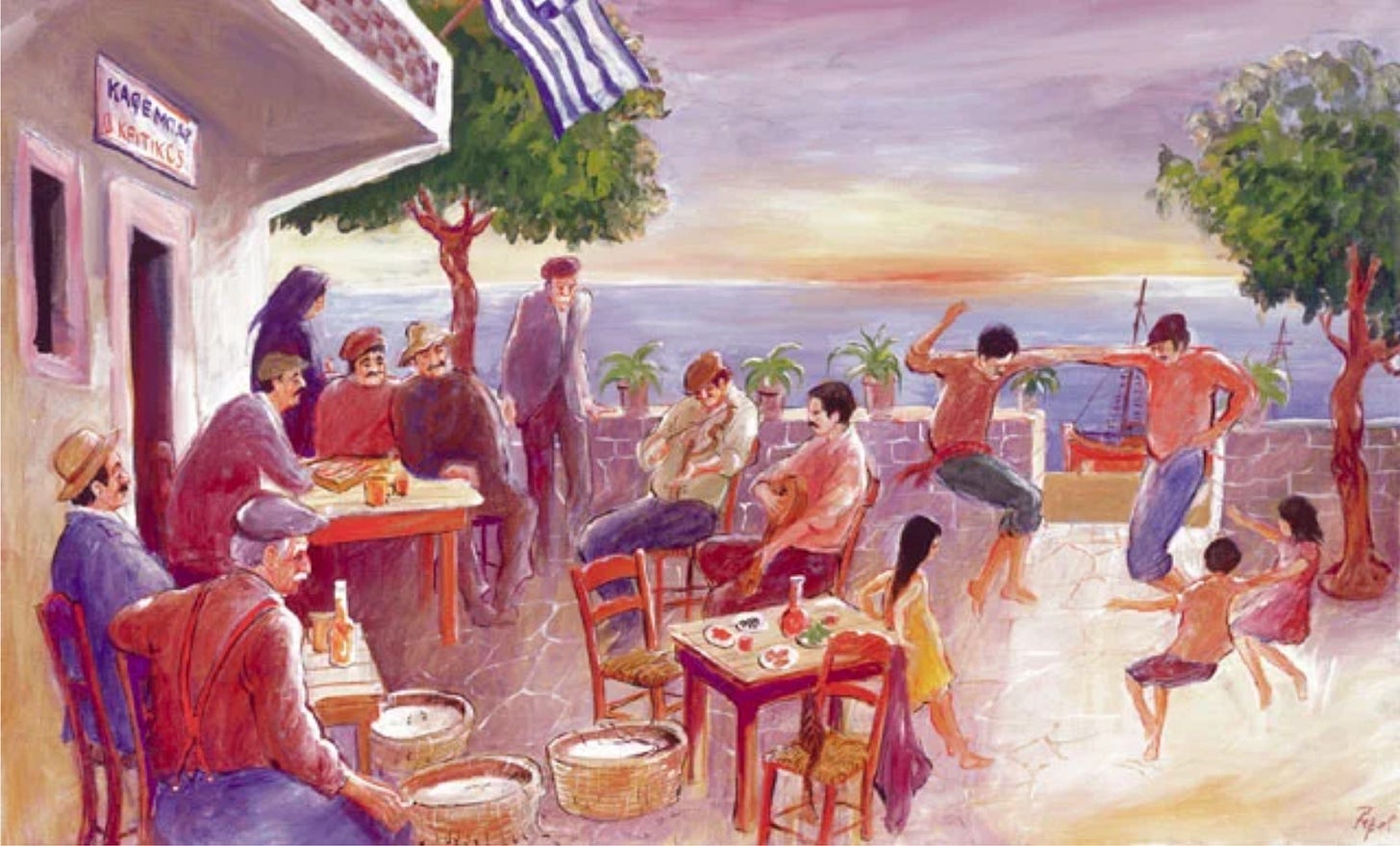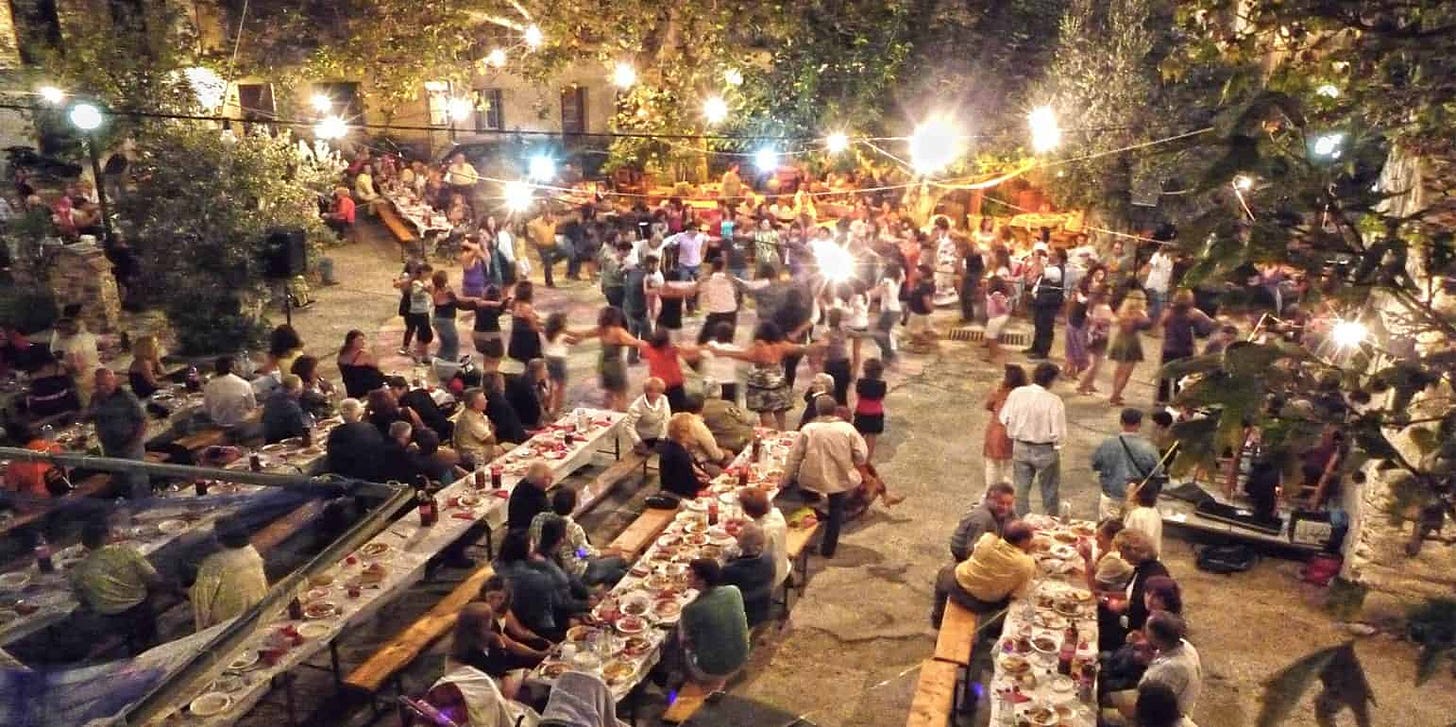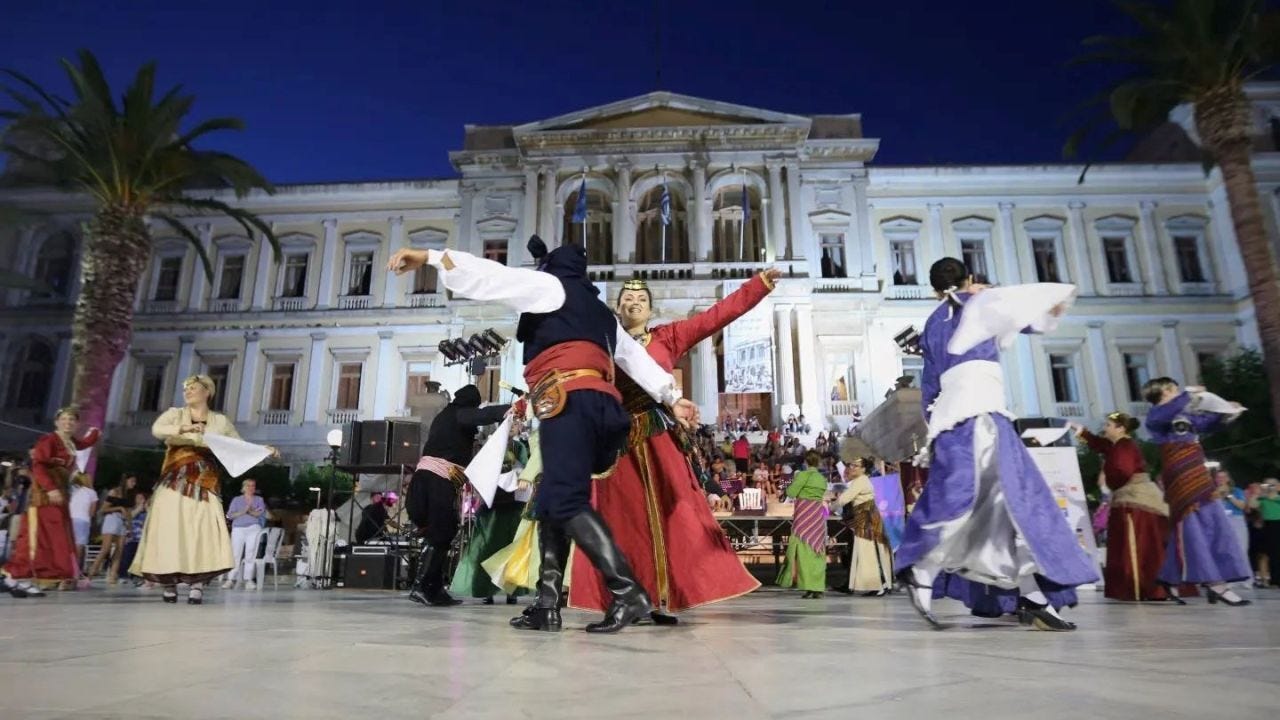
There is simply nothing like a panigyri, the Greek traditional festival gathering.
In Ancient times, panigyria (plural) were dedicated to the worship of a particular God. They soon became celebrations in honor of saints that were patrons of local villages. Although sacrifices are no longer offered, the amount of food available is usually enough to make any deity become an atheist.
Today, panigyria are more than just festivals. They represent an entire way of life and connecting with each other that many of us have long forgotten. Whether in a small Greek island or a far-away mountain, panigyria are the living soul of Greece’s culture. People come together to eat their heart’s content, sing like they just won the lottery, dance until the soles fall off their shoes, see old friends, meet new ones and have fun until the very early hours of the next morning. Panigyria are the pinnacle of authentic Greek social experience.
A cultural time machine
Greek panigiria are the salvation from our busy and monotonous daily rat race in the city. It is the best excuse to ditch our smartphones, and rather than mindlessly keep swiping left or right, sweep the floor with our dancing. Panigyria are a cultural time machine. They help keep our customs alive, bring young and old people together, and ground us to our present. There is something particularly extraordinary in dancing to the same folk song your great grandfather used to sing almost a century ago in the tiny square of your small village.
I have to make a confession: I spent a very big part of my life not appreciating the concept of panigyria. I did not attend them. I did not understand them. I did not care at all to learn more about them. In my mind, they were a combination of old-fashioned and kitsch. They belonged in another era, I thought. How wrong I was…
Like many others, after the COVID era I developed a very strong urge for genuine human interaction and connecting with my roots. A switch had turned in me. With some necessary nudging, I started attending panigyria. This rediscovery was one of the best decisions in my life. And it seems I was not the only one to make it.
Panigyria are enjoying an absolute comeback in Greece. The Greek Gen Z generation has completely embraced them. Modern fashion brands use them as inspiration. Tourists and foreigners adore them. Global media cover them. This is not a coincidence. I have previously talked about the resurgence of Greek August festivals and also praised the authenticity of Greek village life. I really believe in their combined power to help bring us closer together but also rediscover our own roots.
Each year, the largest and most spectacular panigyria are held at the end of the summer, typically on or around August 15 to celebrate the assumption of Virgin Mary. Almost every village tends to have their own panigyri. Ikaria is perhaps Greece’s most famous hub and has become synonymous to the concept of never-ending dancing festivals. Crete is one of the top destinations. Epirus has a ton of amazing ones too. The Peloponnese is also home to numerous expressive local happenings. In fact every corner of Greece is full of amazing panigyria to discover. There is even an app/website now dedicated to finding your nearest panigyri: e-panigiria.

Greek festivals
In recent years, Greece has also started producing a number of thematic festivals that borrow from the tradition of panigyria and celebrate Greek local cultural elements. These are typically well-organized music or dance festivals, but we have also started seeing the emergence of other cultural happenings, such as food and movie festivals.
I find the quality and diversity of these events impressive. I truly wish I had the time and energy to visit them all, but maybe one of you might succeed in that instead.
Below you can find some of my favorite festivals from all around Greece.
Vlatos Jazz Festival (Crete)
Vlatos Jazz is an annual music festival held in the village of Vlatos on the western part of the island of Crete. Vlatos Jazz focuses on acoustic jazz and world music, hosting a diverse range of artists from local Cretan musicians to international talents.
Hamezi Festival (Crete)
Hamezi (or Hamaizi) is a beautiful small village located at the eastern end of Crete, 11 kilometers west of the city of Sitia. Hamezi Festival is a festival of music, art and culture organized since 2023.
Do yourself a favor and watch the video below. Thank me later.
Houdetsi Festival (Crete)
Perhaps the single greatest festival of recent times was the one taking place in Houdetsi village. Started in 2010 by the legendary world singer Ross Daly, the Houdetsi Festival was an oasis of music, tradition and culture.
Unfortunately, it has stopped taking place in recent years, but there are thoughts of reviving some form of it. It would be truly a shame for this amazing tradition not to continue.
Syrianopato (Syros)
The "Syrianopato" Traditional Dance Festival has been organized in Syros since 2018 by the Folklore - Dance Club "The Wisdom of Tradition". The festival is aimed at both children and adult dance groups that present a sample of traditional dances in the beautiful city of the “Lady of the Cyclades”.
Why should the mountains be black? (Konitsa)
Situated in the field of the historical House of Hamko in Konitsa, the festival Why Are the Mountains Black has taken place for the past two years to celebrate the musical cultures of the Balkans. It is organized by the Onassis Stegi and features daoulia, zurnades, polyphnic groups from other Balkan countries and solo performances.
Small bonus: a video celebrating the amazing singing culture of Epirus from an earlier festival also in Konitsa.
Helmos Mountain Festival (Kalavryta)
Organized by the Kalavryta Ski Center, Helmos Mountain Festival is a three-day festival of music, outdoor activities and recreation at the foothills of Helmos mountain. It is primarily attended by a younger crowd who love nature.
Pontic Dancing Festival (Kozani)
The traditional Pontic dance festival is a sight to behold. Thousands of dancers from Pontic clubs all over Greece come together each year to celebrate, remember and pay tribute to their Pontic history.
Nikolaos Tselementes Festival (Sifnos)
The Nikolaos Tselementes Festival is the only Cycladic gastronomy festival in all of the Cyclades. The festival lasts three days and enjoys international recognition. Delegations mainly from the Cycladic islands, along with some from the rest of Greece, meet in Sifnos and present their special gastronomic delights.
Ierapetra Amateur Theater Festival (Crete)
The Ierapetra Amateur Theater Festival is located in Ierapetra, the Southernmost city in Europe. The festival welcomes theater groups from all over Greece to perform in front of a large audience of attendees and judges.
Conclusion
If you are already immersed in the world of panigyria, I am so very happy. If, like my former self, you are still hesitant about them, try giving them a chance. You might be surprised by the energy, sense of community, and pure joy that fills the air.
Panigyria are more than just festivals. They are the living embodiment of Greek tradition, a bridge between past and present, and a reminder of the simple beauty of humans coming together. So next time you find yourself near a panigyri, step into the circle, embrace the rhythm, and let the magic of the moment guide you.
That’s it for today! If you enjoyed today’s newsletter, please let me know with a like or reply. And if you value my content each week, consider pledging your support. Thanks!






An other masterpiece, genuine, Greek and analytical 👏🏼👏🏼👏🏼. Panygiria.. I was a snob too.. but now in my early 50s.. I take a week off to travel to northern Greece to go to as many panygiria as possible (from the UK). I still struggle to get up to dance however I love seeing the tapestry of the whole Greek society unfolding in front of my eyes.. Greeks and expats Greeks of all ages and backgrounds all together drinking basic retsina or beers and eating the most unhygienic souvlakia cooked by Babis the Shepard (a volunteer).. the magic in northern Greece is that you can find 3-4 different types within 10km from your home (e.g Drama or Kavala). Thracian, Pontiac, Local Macedonian, even Cretan and of course a bit of a cocktail in most cases with the odd Zembekiko at the end of the night.. love them.. will be there mid July so all recommendations welcome 🙏
I took my partner to his first panygiri last summer. He was astounded. I said “there will be a lot of long tables, white chairs, roasted chestnuts, loukoumades, people of all ages dancing until the sun comes up” and it was exactly that… perched on a mountain between Nafpaktos and Messolonghi …. It was magical